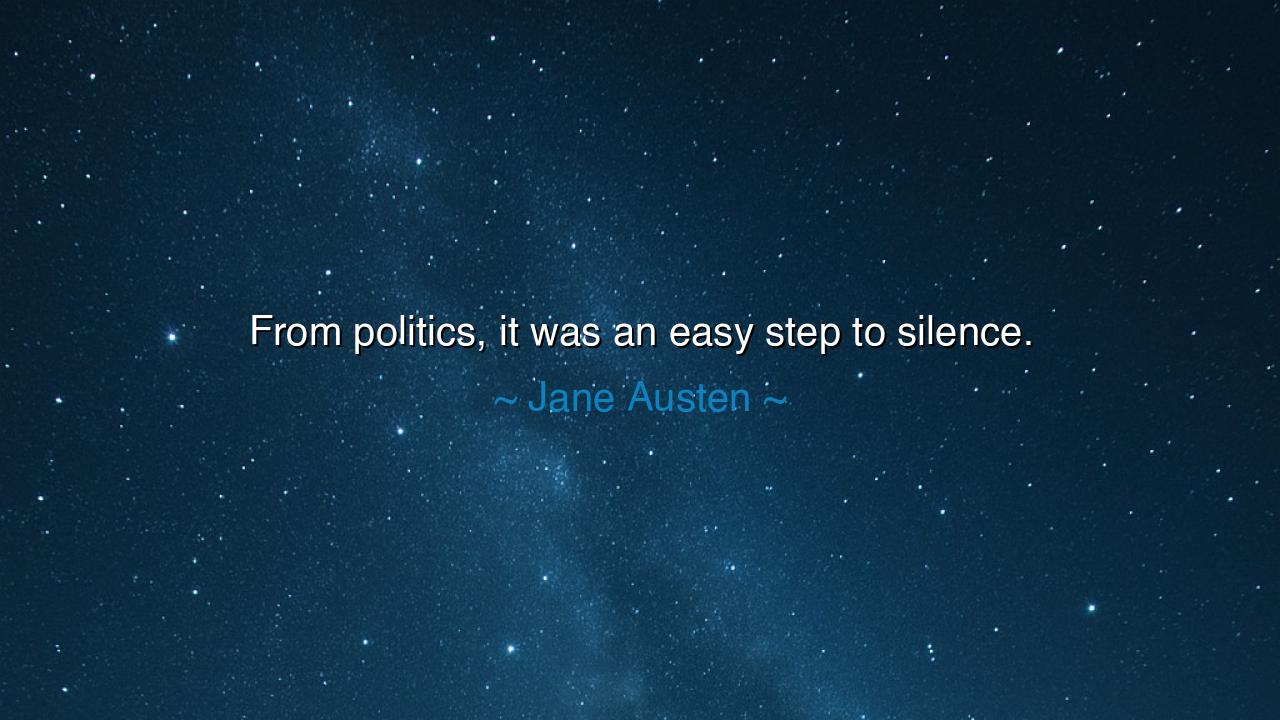
From politics, it was an easy step to silence.






Jane Austen’s words—"From politics, it was an easy step to silence"—hold within them both subtle irony and timeless wisdom. She shows us how the tumult of politics, with its endless quarrels and shifting allegiances, often ends not in triumph but in weariness. What begins as loud debate and fiery rhetoric may collapse into silence, for words, once exhausted, cannot always pierce the armor of power or the stubbornness of pride.
In her gentle but piercing way, Austen reminds us that politics can consume itself. Men who argue too long find that their voices lose weight, and assemblies once filled with thunderous speech often dissolve into a hush. For when reason falters and truth is obscured, what remains but silence? Sometimes it is the silence of defeat, sometimes the silence of resignation, and sometimes the silence of wisdom that refuses to waste words where words no longer matter.
History gives us a vivid example in the Athenian Assembly. In its golden days, voices rose like waves in passionate debate over war and peace. Yet when Athens faced the crushing weight of Sparta in the Peloponnesian War, the fervor of politics turned to despair. Leaders were silenced by failure, or struck down by the people’s wrath. What had been fiery rhetoric fell into silence, the stillness of a city broken by its own divisions. Thus the fate of Athens teaches us what Austen hints: the loudest debates may end not in glory, but in quiet ruin.
There is also a gentler meaning in her words. Austen, ever attuned to human nature, understood that polite society avoided the loud clash of politics. For in drawing-room and parlor, it was but an easy step from controversy to discomfort, and thence to silence. To her, silence was sometimes the wiser refuge, a sanctuary from fruitless quarrel. In this way, the saying carries both a critique of public life and a counsel for private life: not every battle of words is worth the breath it costs.
Let future generations hear this truth: politics will always stir the tongues of men, but the wise know when to speak and when to embrace silence. For words are arrows, and once loosed, they cannot return. But silence, when chosen with care, may be a shield stronger than speech. To master both—the storm of words and the stillness of silence—is to hold the wisdom of ages.






TTTu Trieu
Austen's words seem to capture the despair that can arise from being involved in politics. Is it possible that the constant bickering and disillusionment in politics push individuals to retreat into silence? Could this be a warning to avoid getting too deeply involved in the negativity of political life, or does it suggest that silence itself is a consequence of the political system's failure to listen?
2L2006 liindthuong
This quote from Jane Austen might highlight how exhausting politics can be. Is it possible that the act of participating in politics becomes so draining that silence seems like the only escape? How much do individuals internalize the conflicts and struggles of political life, leading them to withdraw into silence? Can this withdrawal also reflect a desire for personal peace, away from the chaos of political battles?
MPThao My Phung
Austen’s quote seems to imply that politics can be overwhelming to the point where silence feels like a safer option. Is this a reflection of the frustrating reality where people feel their voices aren’t heard or don’t matter? Is it possible that those who leave politics or disengage from it are choosing silence as a form of personal protection from the constant battles of public discourse?
VCnguyen van cuong
Jane Austen's statement seems to suggest that the world of politics can lead to a sense of disillusionment or apathy. Could it be that political engagement sometimes results in a loss of voice or a feeling of helplessness, pushing individuals into silence? Does this resonate with how some people might feel about politics today? Is the 'easy step to silence' a sign of giving up or a sign of wisdom?